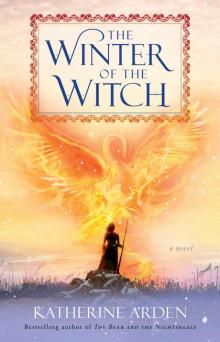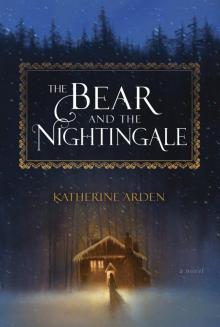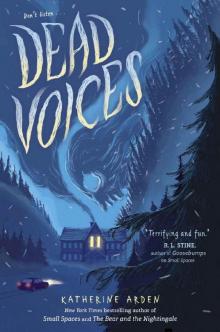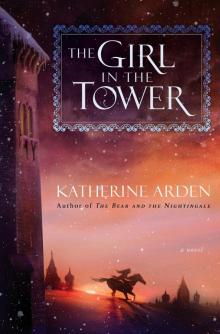- Home
- Katherine Arden
The Winter of the Witch Page 2
The Winter of the Witch Read online
Page 2
“Olga will not rest,” she said. “She puts us all to shame.”
You have not rested either, returned the horse, blowing warm air onto her face.
Vasya, flinching, pushed him away; his hot breath pained the burns on her scalp and cheek. “I do not deserve to rest,” she said. “I caused the fire; I must make what amends I can.”
No, said Solovey, and stamped. The Zhar Ptitsa caused the fire, although you should have listened to me before setting her loose. She was maddened with imprisonment.
“Where did she come from?” Vasya asked. “How did Kasyan, of all people, put a bridle on a creature like that?”
Solovey looked troubled. His ears tilted forward and back, and his tail lashed his flanks. I do not know how. I remember someone shouting, and someone weeping. I remember wings, and blood in blue water. He stamped again, shaking his mane. Nothing more.
He looked so distressed that Vasya scratched the stallion’s withers and said, “Never mind. Kasyan is dead and his horse is gone.” She changed the subject. “The domovoi said Masha was here.”
Of course she’s here, returned the horse, looking superior. Even if she doesn’t know how to speak to me yet, she knows I will kick anyone who tries to hurt her.
This was not an idle threat coming from seventeen hands of stallion.
“I cannot blame her for coming to you,” Vasya said. She scratched the horse’s withers again, and the stallion’s ears flopped with delight. “When I was small, I always ran to the stable at the first sign of trouble. But this is not Lesnaya Zemlya. Olya was frightened when they found her gone. I must take her back.”
The little girl in the straw stirred and whimpered. Vasya dropped gingerly to her knees, trying not to jar her sore side, just as Marya came awake, thrashing. The child’s head butted into Vasya’s ribs, and she narrowly avoided a scream; her vision went black around the edges.
“Hush, Masha,” Vasya said, when she could speak again. “Hush. It’s me. It’s all right. You’re all right. You’re safe.”
The child subsided, rigid in the older girl’s arms. The big horse put down his head and nosed her hair. She looked up. He lipped her nose very gently, and Marya squeaked out a tiny giggle. Then she buried her face in the older girl’s shoulder and wept.
“Vasochka, Vasochka, I don’t remember anything,” she whispered between sobs. “I just remember being scared—”
Vasya remembered being scared, too. At the child’s words, images from the night before crossed her mind like flung darts. A horse of fire, rearing up. The sorcerer withering, crumpling to the floor. Marya ensorcelled, blank-faced, obedient.
And the winter-king’s voice. As I could, I loved you.
Vasya shook her head, as though motion could dispel memory. “You don’t have to remember; not yet,” she said gently to the girl. “You are safe now; it is over.”
“It doesn’t feel like it is over,” whispered the child. “I can’t remember! How do I know if it’s over or not?”
Vasya said, “Trust me, or if you will not, trust your mother or your uncle. No more harm will come to you. Now, come, we must get back to the house. Your mother is worried.”
Marya immediately wrenched away from Vasya, who had little strength to stop her, and wrapped all four limbs around Solovey’s foreleg. “No!” Marya shouted, face pressed to the horse’s coat. “You can’t make me!”
An ordinary horse would have reared at such antics, or shied, or at the very least hit Marya in the face with his knee. Solovey only stood there, looking dubious. Gingerly, he put his head down to Marya. You can stay here if you like, he said, although the child did not understand him. She was crying again: the thin exhausted wail of a child at the end of endurance.
Vasya, sick with pity and anger on the girl’s behalf, understood why Marya did not want to go back to the house. She had been taken from that house, subjected to half-remembered horrors. Solovey’s large and self-confident presence was nothing if not reassuring.
“I have been dreaming,” the little girl mumbled into the stallion’s foreleg. “I can’t remember anything—except for the dreaming. There was a skeleton that laughed at me, and I kept eating cakes—more and more—even though they made me sick. I don’t want to dream anymore. And I’m not going back to the house. I am going to live here in the stable with Solovey.” She renewed her grip on the stallion.
Vasya could see that unless she chose to pry Marya off and drag her away—a procedure that her broken rib wouldn’t bear and Solovey would heartily disapprove of—the girl wasn’t going anywhere.
Well, let someone else explain to an irascible stallion why Marya could not stay where she was. In the meantime— “Very well,” Vasya said, and made her voice cheerful, “no need to go back to the house unless you wish it. Shall I tell you a story?”
Marya’s death-grip on Solovey loosened. “What kind of story?”
“Any story you like. Ivanushka and Alenushka?” Then Vasya’s heart misgave her. Sister, dear sister Alenushka, said the little goat. Swim out, swim out to me. They are lighting the fires, boiling the pots, sharpening the knives. And I am going to die.
But his sister couldn’t help him. For she’d already been drowned herself.
“No, perhaps not that one,” said Vasya hastily and thought. “Ivan the Fool perhaps?”
The child pondered, as though the choice of tales were a momentous one that could change the history of that bitter day. For her sake, Vasya wished it were so.
“I think,” said Marya, “that I would like to hear the story of Marya Morevna.”
Vasya hesitated. As a child, she had loved the story of Vasilisa the Beautiful, her own fairy-tale namesake. But the tale of Marya Morevna would cut deep—perhaps too deep—after the night before. Marya wasn’t finished though. “Tell about Ivan,” she said. “That part of the story. About the horses.”
And then Vasya understood. She smiled, and didn’t even care that smiling tugged at the burnt skin on her face.
“Very well. I will tell that part, if you will let go of Solovey’s foreleg. He is not a post.”
Marya let go of Solovey reluctantly, and the stallion lay down in the straw, so that both girls could curl against his warm side. Vasya wrapped Marya and herself in her cloak and began, stroking Marya’s hair:
“Prince Ivan tried three times to rescue his wife, Marya Morevna, from the clutches of the evil sorcerer Kaschei,” she said. “But each time he failed, for Kaschei rode the fastest horse in all the world, and moreover one who understood the speech of men. His horse could outrun Ivan’s, no matter how great his start.”
Solovey snorted out a complacent, hay-scented breath. That horse couldn’t outrun me, he said.
“At last, Ivan bid his wife Marya to ask Kaschei how he had come to ride such a matchless horse.
“ ‘There is a house on chicken legs,’ replied Kaschei. ‘Which stands upon the shore of the sea. A witch lives there: a Baba Yaga, who breeds the finest horses in all the world. You must cross a river of fire to get to her, but I have a magic kerchief that parts the flames. Once you have come to the house, you must ask to serve the Baba Yaga for three days. If you serve her well, she will give you a horse. But if you fail, she will eat you.’ ”
Solovey slanted a thoughtful ear.
“And so Marya, that brave girl”—here Vasya tugged her niece’s black plait, and Marya giggled—“stole Kaschei’s magic handkerchief and gave it to Ivan in secret. And he went away to the Baba Yaga, to win the finest horse in all the world for his own.
“The river of fire was great and terrible. But Ivan crossed it by waving Kaschei’s handkerchief and galloping through the flames. Beyond the fire, he found a little house by the shore of the sea. There lived the Baba Yaga and the finest horses in all the world—”
Here Marya interrupted. “Could they talk? Like you can talk to
Solovey? Can you really talk to Solovey? Does he talk to people? Like the Baba Yaga’s horses?”
“He can talk,” said Vasya, putting a hand up to stem the flow of questions. “If you know how to listen. Now hush, let me finish.”
But Marya was already asking her next question. “How did you learn how to listen?”
“I—the man in the stable taught me,” said Vasya. “The vazila. When I was a child.”
“Could I learn?” said Marya. “The man in the stable never talks to me.”
“Yours is not strong,” said Vasya. “They are not strong in Moscow. But—I think you could learn. Your grandmother—my mother—knew a little magic, they say. I have heard a tale that your great-grandmother rode into Moscow on a magnificent horse, gray as the morning. Perhaps she saw chyerti just as you and I do. Perhaps there are other horses, somewhere, just like Solovey. Perhaps we all—”
She was interrupted by a decisive step in the aisle between the stalls. “Perhaps we all,” said Varvara’s dry voice, “are in need of supper. Your sister trusted you to go and get her daughter, and here I find you two rolling in the straw like a couple of peasant boys.”
Marya scrambled to her feet; Vasya followed painfully, trying not to favor her injured side. Solovey stood up with a heave, his ears pricked toward Varvara. The woman gave him a strange look. For an instant, there was a kind of remote longing in her face, as a woman looks upon something she coveted long ago. Then, ignoring the stallion, she said, “Come on, Masha. Vasya can finish your story later. The soup will be cold.”
* * *
THE STABLE HAD FILLED UP with shadows in the time Vasya and Marya had been talking. Solovey stood still, ears pricked. “What is it?” Vasya asked the horse.
Can you hear that?
“What?” said Varvara, and Vasya looked at her strangely. Surely she hadn’t…
Marya looked suddenly frightened. “Does Solovey hear someone coming? Someone bad?”
Vasya took the girl’s hand. “I said you are safe and I meant it. If there is any danger, Solovey will take us all galloping far away.”
“All right,” said Marya in a small voice. But she held tight to Vasya’s hand.
They walked out into the blued evening. Solovey went with them, huffing uneasily, his nose at Vasya’s shoulder. The blood-colored sunset had diminished to a faint smear in the west, and the air was still and strange. Outside the thick walls of the stable, Vasya could hear what Solovey had heard: the rush and tramp of many feet and a muted rumble of voices.
“You are right; something is wrong,” said Vasya to the horse, low. “And, curse it, Sasha is not here.” Aloud, she added, “Do not worry, Masha, we are safe here behind the gates.”
“Come on,” said Varvara, and made for the outer door, the anteroom and the stair that would lead them back up to the terem.
2.
Reckoning
THE DOORYARD WAS STRANGELY QUIET; the day’s bustle had given way to a heavy calm. Varvara slipped through the outer door of the terem, holding Marya tight by the hand. Vasya turned back at the foot of the stairs, pressed her forehead to Solovey’s silky neck. She wondered why it was so still in the dooryard. Many of Olga’s guards had died or been wounded in the fighting in the Grand Prince’s dvor, but where were her sister’s grooms, her bondsmen? From beyond the gates, the shouting rose. “Wait for me,” she told the horse. “I am going up to my sister, but I’ll come back soon.”
Hurry, Vasya, said the stallion, unease in every line of his body.
Up the stairs to Olga’s workroom. Vasya’s broken rib ran a claw of fire down her side as she climbed. The big, low-ceilinged workroom had a stove for heat, a narrow window for air. It was crowded now; Olga’s attendants had been awakened by the noise. The nurse sat near the stove, clutching Olga’s son, Daniil. The child was eating bread; he was a placid boy, if a bit bewildered. The women were whispering as though they feared to be heard. An air of disquiet had invaded the palace of Serpukhov. Vasya found her blistered palms sweating.
Olga was standing at the narrow window, looking out beyond the dooryard. Marya ran straight to her mother. The princess put an arm around her daughter’s shoulders.
The hanging lamps threw sinister shadows, quivering with the breeze of Vasya’s entrance. Heads turned, but Vasya only had eyes for her sister, who stood unmoving beside the window.
“Olya?” Vasya asked. The voices in the room sank to hear her. “What is it?”
“Men. With torches,” Olga said, still not turning around.
Vasya saw the women exchanging frightened glances. But still she did not understand. “What are they doing?”
“See for yourself.” Olga’s voice was calm. But she wore layers of chains draped over her breast, hanging from her headdress. The lamplight shimmered on the gold, blindingly, showing the speed of her breathing.
“I would send for the guards,” added Olga. “But we lost so many last night, in the fire, or fighting the Tatars. The rest are at the city-gates; the bondsmen are in the city on errands of mercy. All the men we could spare, and they have not returned. Perhaps some were prevented from coming back, perhaps others heard something we did not.”
Daniil’s nurse clutched the child until he squawked. Marya was watching Vasya with hope and blind trust: the aunt who had a magic horse. Trying not to limp, Vasya crossed to the window. As she passed, a few of the women averted their eyes and crossed themselves.
The street before the gates of Serpukhov was thronged with people. Many bore torches; all of them were shouting. Near the open window, their rising voices came clear at last to Vasya’s straining ears.
“Witch!” they shouted. “Give us the witch! Fire! She set the fire!”
Varvara said flatly to Vasya, “They are here for you,” and Marya said, “Vasochka—Vasochka—do they mean you?” Olga’s arm was stiff, holding her daughter close.
“Yes, Masha,” said Vasya, dry-mouthed. “They do.” The crowd before the gate spread like a river against a rock.
“We must bar the door to the palace,” Olga said. “They might break the gate. Varvara—”
“Have you sent for Sasha?” Vasya interrupted. “For men from the Grand Prince?”
“Whom exactly is she supposed to send?” said Varvara. “All the men were in the city when this started. Curse it. I would have had some warning myself, were I not in the terem all the day, and so weary.”
“I can go,” said Vasya.
“Don’t be a fool,” snapped Varvara. “Do you think you’ll not be recognized? Do you mean to ride that great bay stallion too, that every man, woman, and child in this city will know on sight? I will go, if anyone.”
“No one is going,” said Olga coolly. “Look, we are surrounded.”
Vasya and Varvara turned toward the window again. It was true. The pool of torches had spread.
The women’s whispers were shrill now with fright.
The crowd swelled; people were still streaming in from side-streets. They began pounding on the gate. Vasya could not make out individual faces in the crowd; the torches dazzled her eyes. The dooryard beneath them lay cold and silent.
“Be easy, Vasya,” said Olga. Her face was rigidly calm. “Don’t be frightened, Masha; go and sit by the fire with your brother.” To Varvara— “Take women to help you; put whatever you can find against the door. It will buy time, if they break the gate. The tower was built to withstand Tatars. We will be all right. Sasha and the Grand Prince will get word of the disturbance; men will arrive in time.”
The shimmer of Olga’s golden chains still betrayed her unease.
“If it is me they want—” Vasya began.
Olga cut her off. “Give yourself over? Do you think that can be reasoned with?” A sharp gesture took in the seething mob. Varvara was already chivying women off their benches. The wood was sturdy. It would buy them time. Bu
t how much time?
Just then a new voice spoke. “Death,” it whispered.
Vasya turned her head. The voice belonged to Olga’s domovoi, speaking from the oven-mouth. His voice was the whisper of settling ashes after the fire has died.
Every hair on Vasya’s body rose. It is given to the domovoi to know what will happen to his family. In two limping strides, Vasya crossed to the stove. The women stared. Marya’s eyes met Vasya’s in horror; she too had heard the domovoi.
“Oh, what will happen?” Marya cried. She seized Daniil’s bread, making the child wail, and dropped to her knees on the hearth beside Vasya.
“Now Masha—” the nurse began, but Vasya said, “Leave her,” in such a tone that the whole room drew back in fright. Even Olga’s breath whistled out audibly between her teeth.
Marya thrust her bread at the faded domovoi. “Don’t say that,” she said. “Don’t say death. You are frightening my brother.”
Her brother could neither hear nor see the domovoi, but Marya in her pride would not admit that she was frightened. “Can you not protect this house?” Vasya asked the domovoi.
“No.” The domovoi was little more than a faint voice, and a shape cast by the ember-light. “The sorcerer is dead; the old woman wanders in darkness. Men have turned their eyes to other gods. There is nothing left to sustain me. To sustain any of us.”
“We are here,” said Vasya, fierce with fear. “We see you. Help us.”
“We see you,” Marya echoed, whispering. Vasya took the child’s hand, held it tight. She had already reopened one of her innumerable cuts from the night before. She smeared a bloody hand on the hot brick in the oven-mouth.
The domovoi shivered and suddenly looked more like a living creature and less like a speaking shadow. “I can buy time,” he breathed. “A little time, but that is all.”
A little time? Vasya was still holding her niece’s hand. The women were massed at their backs, wearing various expressions of fright and condemnation.

 The Winter of the Witch
The Winter of the Witch The Bear and the Nightingale
The Bear and the Nightingale Dead Voices
Dead Voices The Girl in the Tower
The Girl in the Tower